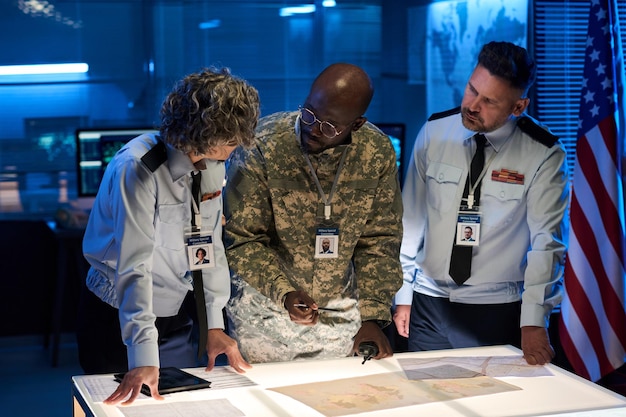New US Initiatives Boosting Veterans’ Education & Careers

New US initiatives supporting veterans’ education and career development are crucial, encompassing programs for skill enhancement, job placement, and educational opportunities that facilitate successful transitions to civilian life.
The transition from military to civilian life can be challenging, particularly when it comes to education and career development. Recognizing these challenges, several new US initiatives supporting veterans’ education and career development have emerged to provide targeted assistance and opportunities.
Understanding the Needs of Veteran Students and Professionals
To effectively support veterans, it’s crucial to understand their unique needs and challenges. These can range from translating military skills to civilian job requirements to addressing potential gaps in education.
Translating Military Skills
Military service equips individuals with a diverse range of skills, often highly valuable in the civilian workforce. However, veterans frequently face difficulties articulating these skills in a way that resonates with civilian employers.
Addressing Educational Gaps
Many veterans may have interrupted their education to serve, or their military training might not directly align with civilian career paths. Addressing these educational gaps is essential for their long-term success.
- Initiatives offering credit for military experience help bridge this gap.
- Programs providing tuition assistance make higher education accessible.
- Mentorship initiatives connect veterans with experienced professionals for guidance.

These initiatives provide veterans with the resources they need to thrive in their post-military careers, addressing both skill translation and educational attainment.
The GI Bill: A Cornerstone of Veterans’ Education
The GI Bill remains a cornerstone of veterans’ education benefits, providing financial assistance for tuition, housing, and books. Recent updates and expansions have enhanced its effectiveness in meeting the evolving needs of veterans.
Post-9/11 GI Bill Enhancements
The Post-9/11 GI Bill offers significant benefits, including full tuition coverage at public institutions and a housing allowance. Enhancements have focused on increasing eligibility and expanding coverage for specific programs.
Yellow Ribbon Program
The Yellow Ribbon Program allows veterans to attend private or out-of-state institutions with tuition costs exceeding the GI Bill’s limits. The program facilitates a partnership between the school and the Department of Veterans Affairs (VA), sharing the excess costs.
These programs are crucial in ensuring that veterans have access to quality education without incurring overwhelming financial burdens.
Innovative Career Development Programs for Veterans
Beyond traditional education benefits, innovative career development programs are playing a significant role in helping veterans secure meaningful employment. These programs often focus on specialized training and direct job placement assistance.
Veterans Opportunity to Work (VOW) Act
The VOW Act aims to improve veterans’ employment outcomes by providing enhanced training and job search assistance. It includes provisions for skills assessment, career counseling, and apprenticeship opportunities.
Helmets to Hardhats
Helmets to Hardhats is a program that connects veterans with opportunities in the construction industry. It provides training, apprenticeships, and direct job placement assistance, leveraging veterans’ skills and discipline.
- These programs bridge the gap between military skills and civilian job requirements.
- They provide industry-specific training and certifications.
- Direct job placement assistance ensures veterans find suitable employment.

These programs are tailored to meet the specific needs of transitioning veterans, providing them with the skills and connections necessary to succeed in their chosen fields.
Supporting Veteran Entrepreneurs
Many veterans possess an entrepreneurial spirit and are eager to start their own businesses. Several initiatives support veteran entrepreneurs through training, mentorship, and access to capital.
Small Business Administration (SBA) Programs
The SBA offers a range of programs specifically designed to support veteran-owned businesses. These include loan guarantees, business counseling, and training programs tailored to the unique challenges faced by veteran entrepreneurs.
Veteran Entrepreneurship Training Programs (VETP)
VETP provides specialized training and mentorship to veterans looking to start or grow their businesses. These programs cover a wide range of topics, from business planning to marketing and finance.
Supporting veteran entrepreneurs not only creates economic opportunities for individual veterans but also contributes to the overall economic growth of the US.
Mental Health and Well-being Support
Addressing the mental health and well-being of veterans is critical to their overall success in education and career development. Many initiatives provide mental health services and support to help veterans overcome challenges related to their military service.
VA Mental Health Services
The VA offers a comprehensive range of mental health services, including counseling, therapy, and medication management. These services are available to all eligible veterans and are tailored to meet their individual needs.
Peer Support Programs
Peer support programs connect veterans with others who have similar experiences, providing a sense of community and understanding. These programs can be invaluable in helping veterans cope with the challenges of transitioning to civilian life.
Prioritizing mental health and well-being ensures that veterans are equipped to handle the demands of education and career development, leading to greater success and fulfillment.
The Role of Community Organizations
Community organizations play a vital role in supporting veterans by providing a range of services, from housing assistance to job training. These organizations often work in partnership with government agencies and private sector companies to maximize their impact.
Local Resources and Support Networks
Local community organizations offer a wide range of resources, including food banks, housing assistance, and transportation services. These resources are often essential for veterans who are struggling to make ends meet.
Partnerships for Jobs and Training
Many community organizations partner with local businesses to provide job training and employment opportunities for veterans. These partnerships help bridge the gap between veterans and employers, ensuring that veterans have access to meaningful employment.
Future Directions and Recommendations
To further enhance support for veterans’ education and career development, several key areas need attention. These include increasing awareness of available resources, improving access to mental health services, and fostering greater collaboration between government agencies, community organizations, and the private sector.
By focusing on these areas, the US can ensure that veterans receive the support they need to thrive in their post-military lives, contributing their skills and experience to the nation’s workforce and economy.
| Key Point | Brief Description |
|---|---|
| 🎓 GI Bill Benefits | Financial aid for tuition, housing, and books for eligible veterans. |
| 💼 Career Programs | Initiatives like VOW Act & Helmets to Hardhats for job training & placement. |
| 🌱 Entrepreneurship | SBA programs & VETP providing support for veteran-owned businesses. |
| ❤️ Mental Health | VA services and peer support programs for veterans’ well-being. |
Frequently Asked Questions
▼
The Post-9/11 GI Bill provides financial support for education and housing to individuals who have served on active duty after September 10, 2001. It covers tuition, fees, and a monthly housing allowance.
▼
The Yellow Ribbon Program helps cover tuition costs that exceed the standard GI Bill limits at private or out-of-state schools. The school and VA share the remaining expenses.
▼
The VOW Act is designed to improve veterans’ employment outcomes through enhanced training, skills assessment, and job search assistance. It aims to help veterans transition to civilian careers.
▼
Veterans can access mental health services through the Department of Veterans Affairs (VA), which offers counseling, therapy, and medication management tailored to the individual needs of veterans.
▼
The Small Business Administration (SBA) and Veteran Entrepreneurship Training Programs (VETP) offer resources like loan guarantees, business counseling, and specialized training to help veterans start and grow businesses.
Conclusion
The array of new US initiatives supporting veterans’ education and career development signifies a strong commitment to ensuring that those who have served our country are equipped for success in their civilian lives. By providing access to education, job training, mental health support, and entrepreneurial resources, these programs empower veterans to achieve their full potential and contribute to the nation’s economic prosperity.





